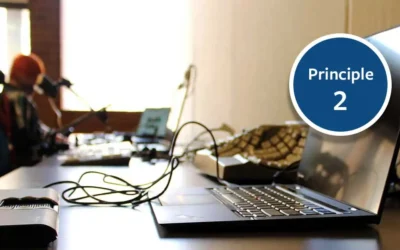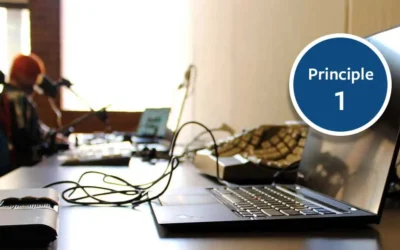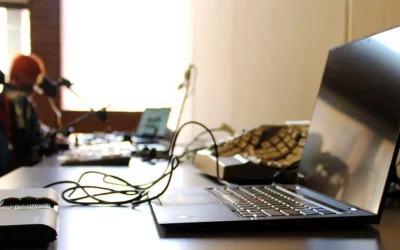Go Visit a Museum – Doctor’s Orders!

Rachael Cristine Woody
The initial draft of this post was written pre-COVID-19. The opening paragraph began with this sentence: “Your next prescription might be for a trip to the museum.” While we’re currently experiencing variant stay-at-home orders, in the short-term a trip to the museum is likely only virtually possible.
But the science and the examples in this post are still relevant as we can use the information to examine how we deliver museum options virtually and adjust the efficacy of our (future) in-person museum programming.
Pre-COVID-19 Doctors Were Prescribing Trips to the Museum
In a pre-COVID world, museums in Montreal, Canada were working with doctors to send patients to the museum in an effort to improve their health. In an Inc.com article the venture is described as: “An innovative partnership between the local art museum […] and a doctor’s association is allowing physicians to literally prescribe free art to their ailing patients.” As museum professionals we’re already aware of the positive impact museums can have, especially when applied as a balm to the soul. That’s one of the reasons why we work where we do. However, a pre-COVID trip to the museum was not usually top of mind for the general public, and it’s especially not an obvious consideration when one thinks of bettering their health.
How did the Prescriptions Work?
Each physician was given a pad of 50 slips to dispense at their discretion. As reported by Fortune in July 2019: since November 2018, the partnership between Médecins Francophones du Canada and the Montreal Museum of Fine Arts has filled 185 prescriptions. One prescription was good for two adults and two children to be admitted to the museum.
A Resident Art Therapist
Another example of museums working to improve community health is the Montreal Museum of Fine Arts. It’s the first museum in North America to appoint a resident art therapist: Stephen Legari. Legari explains:
[A]rt can be a supplemental remedy for a host of ailments, from mental health disorders (such as depression or anxiety) to Alzheimer’s disease to cardiac arrhythmia. […] Or perhaps a family caring for a unwell child could benefit from some visual therapy. “These people are heroes,” says Legari. “Maybe they need a day off.”
People who Visit Museums Live Longer
Now let’s examine the science behind the health claim. The University College London research shows museum visits help people live longer (study published in British Medical Journal). Their findings show people who engage in the arts (museums are specifically listed) every few months or more had a 31% lower risk of premature death when compared to those who didn’t. Those who went just once or twice a year earned a 14% lower risk. Daisy Fancourt, an associate professor at University College London’s Research Department of Behavioural Science and Health, explains:
“While other health behaviors like smoking, alcohol and exercise are undoubtedly bigger predictors of mortality, these leisure and pleasure activities that people don’t think [of] as a health related activity do support good health and longevity.”
This tracks with a 2017 study of 1,500 participants conducted by the National Endowment for the Arts, reporting that Americans over 55 who did not create art or go to concerts, museums or plays reported higher rates of hypertension and cognitive decline than those who did. None of this is a surprise to Gabriella Souza of Walters Art Museum, a museum that offers free admission and receives approximately 160,000 visitors a year. Souza reports in a December 2019 New York Times article that a recent study revealed 20% of Walters patrons say they come for “peace and rejuvenation”.
Access to Museums (and Healthcare) for Better Health Has an Affordability Problem
The University College London study (reviewed above) attempted to analyze if socioeconomic factors played a role and found that over half the association is independent of socioeconomic status. However, it’s important to note that visiting museums are typically perceived as an activity available only to wealthy people. And the reality—at least in America where there isn’t subsidized healthcare—is that only those of a certain socioeconomic level can afford healthcare and a trip to the museum. At least with the Montreal museum experiment the prescription pad provides a free ticket to the museum—directly making the museum financially accessible to anyone who needs it.
So, What Does This Mean for Us Virtually?
Most of us are still in virtual-only mode, so the question is: Can these health benefits be delivered to the virtual visitor? The studies listed above center around the “taking a mental break” and “peace and rejuvenation” factors as having a direct effect on mental health, cognitive agility, and overall corporeal health. Museums can offer a virtual respite and experiment with the efficacy of what they present and how. The better a museum can virtually emulate the physical feeling of being in a museum space, the higher the likelihood virtual visitors will experience a version of the health benefits outlined above.
What Next?
Museum advocacy is always on our list of things-to-do and it’s especially important to engage in advocacy work now, when many museums are struggling from the financial repercussions of a global pandemic. We often cite museums as places for learning, creating empathy, fostering dialog, and bringing in tourism dollars. We now have one more piece of persuasive evidence to add to our advocacy toolkit: museums are good for our health.
Conclusion
Whether virtual or physical, museums offer a boost to our health and overall social well-being.
Museums have an opportunity here to capitalize on an additional tangible benefit they bring to their communities. But to do so, museums will need to be literate in the research and invest in both in-person and virtual programming to help support a community health initiative. And it wouldn’t hurt to create affordable options to help ensure that museums are financially accessible to everyone who may need a little soul balm.

Rachael Cristine Woody
Consultant, author, and blogger Rachael Cristine Woody advises on museum strategies, collections management, grant writing and the future of museums for a wide variety of clients. Read Ms. Woody’s other blog posts and check out Lucidea’s unrivaled CMS, Argus, that empowers museum workers and virtual visitors to say connected, no matter what.
Similar Posts
Museum Collections Online with Accessibility Principle 2: Operable
Compliance with WCAG Version 2.1 Principle 2: Operable
Museum Collections Online with Accessibility Principle 1: Perceivable
Compliance with WCAG Version 2.1 Principle 1: Perceivable, affecting information published from museum CMS to an online portal; expert guidance
Accessibility Standards for Museum Collections Online
A museum’s compliance with the ADA Title II 2024 update has benefits for its online content and for the museum’s community of users.
Museum TrendsWatch 2024: Digital Twins and Doom Loops & Combatting the Loneliness Crisis
Digital Twins is the construction of a digital surrogate for a person, place, or thing—one of several new concepts and trends in the museum sector.




Leave a Comment
Comments are reviewed and must adhere to our comments policy.
0 Comments